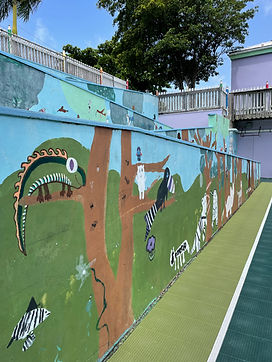

INTERMEDIATE GRADES
Third, Fourth, Fifth Grades / Ages 8 - 11
In grades three, four, and five academic rigor means digging into the skills and habits of a critical thinker and problem solver. Students are independent readers who practice expressing their thoughts in writing. Mathematical reasoning, a strong number sense and fluency in math facts form the foundation for solution strategies.

ACADEMIC RIGOR
In Gifft Hill School’s intermediate classrooms, academic rigor means digging into the skills and habits of a critical thinker and problem solver.

ENGLISH & WRITING
Students are independent readers who are learning how to support their inferences, deductions, and analysis with evidence from the text. They are practicing expressing their thoughts in writing with clear organizational flow, sufficient supporting details, vivid vocabulary, and a variety of sentence structures. Students participate in small group, skillbased literature circles and whole class reader’s workshops to further their knowledge and understanding of literary devices and reading comprehension strategies. Students use Accelerated Reader’s online assessment system to motivate and track their independent reading in a “just right” book of their own choosing. Students at GHS typically read at least 1 “just right” book a week as part of our independent reading program.
Writing instruction is presented through writer’s workshops. During this time, students may be writing, revising, conferencing with a teacher or peer, or participating in directed mini-lessons on specific “craft” skills. Students write and publish work in a variety of genres and present their work to audiences including classmates, younger students, older students, parents, and community members.

MATH
By the end of 5th grade students are fluent in the math facts for all four basic operations and they are beginning to use solution strategies (working from concrete to pictorial to abstract algorithms) to engage with increasingly abstract mathematical concepts.
Students use manipulatives and bar models to solve problems involving increasingly abstract mathematical concepts including multi-digit multiplication, long and short division, fractions, decimals, converting units of measurement, and two and three step story problems. Students talk about, and formally present, their mathematical problem solving process using correct terminology and complete sentence phrasing of answer statements.

STEAM / WEEK
STEAM projects incorporate science and engineering standards focused on providing opportunities to question, analyze, and compare observations about the world. Students engage in the experimental design process using developmentally appropriate vocabulary and procedures to solve real problems facing their classroom and local communities.
Students engage in weekly STEAM projects including lab experiments which make earth and life science concepts tangible, and engineering tasks which apply physical science principles to real life design models. Teachers partner with the National Park Service and St. John School of the Arts to enrich the social studies curriculum with experiential learning opportunities including history walks, work with NPS archeologists and ethnographers, and local experts in cultural music, dance, and storytelling.

SOCIAL STUDIES & SCIENCE
Social Studies and Science standards for these grade levels continue to emphasize providing students with opportunities to question, analyze, and compare observations about the world around them.
.jpg)
SIGNATURE PROGRAMS
Students enrich their experience in the intermediate grades with signature programs including Broadway Comes to St. John (provided in partnership with St. John School of the Arts) in 4th grade, and Dancing Classrooms in 5th grade. Enrichment teachers including the EARTH, Art, Health/PE, Music, and Spanish frequently partner with teachers to provide cross-curricular instruction and to design performance assessments which measure student learning.
.png)